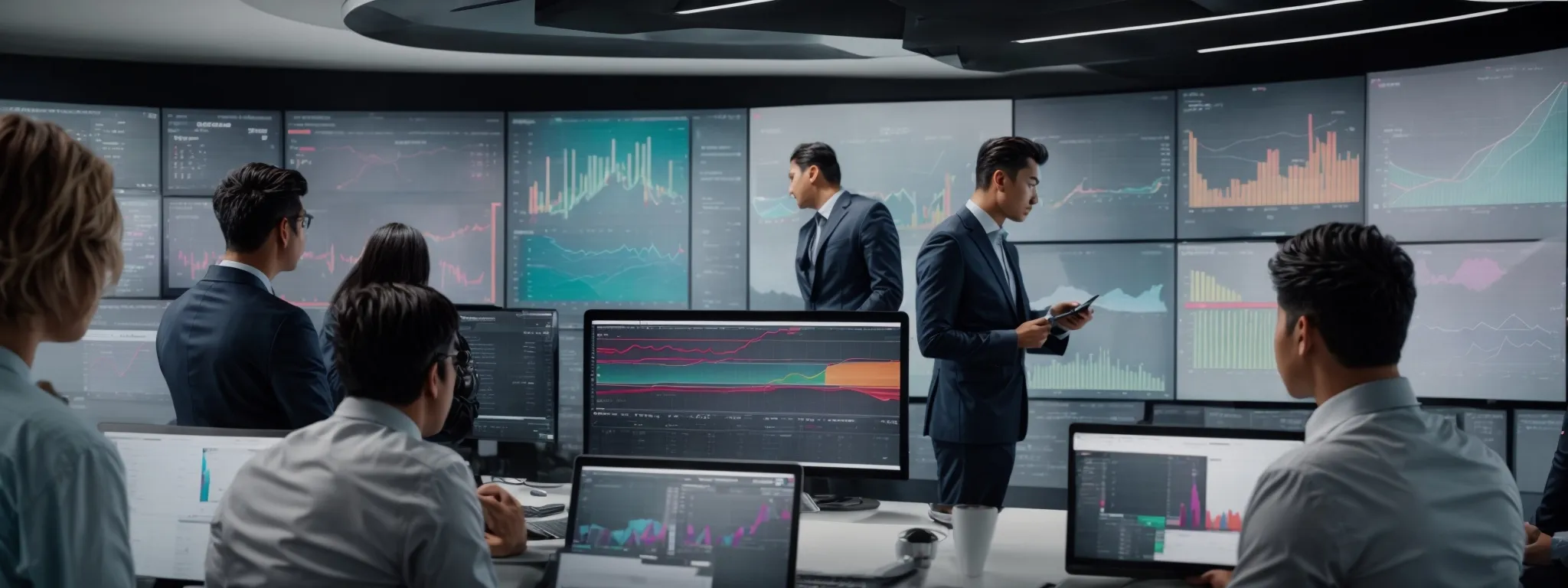What Is B2C Digital Marketing
Understanding B2C Digital Marketing: An Overview B2C digital marketing unfolds as a dynamic arena where brands connect directly with consumers, leveraging online channels to influence buying decisions […]
Understanding B2C Digital Marketing: An Overview
B2C digital marketing unfolds as a dynamic arena where brands connect directly with consumers, leveraging online channels to influence buying decisions and build lasting relationships.
As the digital landscape evolves, so do the tactics and technologies employed by savvy marketers aiming to engage their target audience effectively.
This realm of marketing not only encompasses the vast potential of social media and email campaigns but also calls for a deep understanding of consumer behavior and the optimization of the purchasing journey via search engine strategies.
At the heart of these efforts lies the imperative need to stand out in a crowded online marketplace, where strategic SEO and compelling content marketing can make all the difference.
Keep reading to discover how integration of LinkGraph’s solutions and the immersive capabilities of SearchAtlas SEO software can elevate a B2C digital marketing strategy.
Key Takeaways
- B2C Digital Marketing Strategies Focus on Immediate Consumer Needs for Quick Purchase Decisions
- Technological Advancements Such as AI and AR Are Integral for Personalization in B2C Marketing
- Adherence to Privacy Regulations Like GDPR Is Crucial for Building Consumer Trust in B2C Enterprises
- Multichannel Strategies Elevate Brand Engagement and Customer Retention in B2C Marketing
- Employing SEO and Targeted PPC Advertising Boosts Visibility and Conversion for B2C Companies
Exploring the Meaning of B2C Digital Marketing

Business-to-consumer digital marketing, commonly referred to as B2C digital marketing, encapsulates the strategies and tactics companies employ to promote products and services directly to individual consumers.
Unlike its business-to-business (B2B) counterpart, B2C marketing focuses on the immediate needs and interests of the consumer, crafting a customer journey that is both engaging and tailored to facilitate quick purchase decisions.
As marketers in the B2C space navigate the ever-shifting digital landscape, an understanding of the B2C model’s intricacies, the digital marketing evolution within this domain, and the critical components that constitute effective B2C marketing strategies becomes essential.
These components not only resonate with target customers but also align with overarching business goals, leveraging powerful tools like LinkGraph and SearchAtlas by LinkGraph to maximize reach and conversion in the competitive digital arena.
Defining the B2C Model
The B2C model, succinctly put, is a paradigm where businesses target individual consumers to sell goods or services, often with significant focus on creating compelling customer experiences. This contrasts markedly with B2B markets, where transactions occur between companies and the sales cycle is typically more protracted and complex.
At its core, the B2C approach revolves around the buying process, which is typically shorter and driven by emotion rather than logic. Marketers must effectively appeal to the consumer’s desire for instantaneous gratification, presenting solutions that resonate on a personal level rather than through the lens of business utility.
The Evolution of Digital Marketing in B2C
The B2C digital marketing landscape has been transformed profoundly by the advent of new technologies and the surge in social media and mobile device usage. Whereas traditional marketing channels once dominated, digital platforms now offer unparalleled access to target customers, providing B2C marketers with the opportunity to reach consumers at any time and on any device.
This transformation has necessitated a pivot in strategy, compelling B2C companies to employ a more holistic digital marketing plan. Compelling content, strategic email campaigns, and a perceptive use of PPC Google Ads have become integral to capturing consumer attention and converting clicks into purchases:
| Year | Marketing Focus | Key Channels | Innovations |
|---|---|---|---|
| Early 2000s | Email Marketing | Email Lists, Newsletters | Personalization Techniques |
| 2010s | Social Media & Content | Social Networks, Blogs | Engagement Analytics |
| 2020s | Integrated Digital Experiences | Omnichannel Marketing | AI, AR, and VR Tech |
Key Components of B2C Digital Marketing
In the bustling world of B2C digital marketing, content marketing strategy and SEO reputation management stand as pillars of growth and customer acquisition. A robust content strategy supports brands to engage with their audience, telling a compelling brand story that helps forge strong connections and drive meaningful interactions.
Another pivotal component is the tactical employment of PPC Google Ads. This enables businesses to precisely target their audience, boosting the visibility of their offerings at the opportune moments: right when potential customers are making decisions or showing interest.
- Understanding the import of quality, relevant content that aligns with consumer interests.
- Mastering SEO to ensure content reaches the intended audience through organic search.
- Strategically harnessing PPC advertising to augment brand visibility and consumer reach.
Grasping the Core Strategies of B2C Marketing Online

In the realm of B2C digital marketing, companies must constantly evolve and refine their strategies to stay ahead.
Tapping into the vast potential of social media is crucial for brand awareness, while crafting effective content marketing plans remains key in engaging and influencing the customer journey.
Email campaigns continue to be a lifeline for direct communication and customer retention, as well as for driving sales.
Paid advertising, when executed strategically, serves as a accelerant to these efforts, ensuring that messaging cuts through the noise to captivate the target audience.
Additionally, forging partnerships with influencers can amplify a brand’s message, reaching consumers on a relatable and personal level.
Together, these vital strategies shape a cohesive digital marketing plan, ensuring brands can effectively connect with their consumer base.
Seizing Opportunities With Social Media
In the dynamic sphere of B2C digital marketing, embracing social media is tantamount to unlocking a treasure trove of engagement opportunities. Platforms like Instagram, Facebook, and Twitter empower businesses to connect with target customers in real-time, fostering interactive conversations and building community around the brand.
Leveraging these platforms translates into greater brand visibility and can lead to increased loyalty among consumer demographics. By crafting authentic and targeted messaging through regular posts, stories, and live interactions, companies capitalize on the unique strengths of each social network:
- Instagram’s visual-heavy platform is ideal for showcasing products and lifestyle content.
- Facebook’s diverse user base enables broad audience reach and in-depth market segmentation.
- Twitter’s rapid content dissemination accelerates the spread of brand messaging and news.
Crafting Effective Content Marketing Plans
Content marketing plans lie at the heart of successful B2C digital marketing, bridging the gap between impactful storytelling and consumer engagement. By devising a strategic content planner tool, companies ensure a constant stream of relevant information that resonates deeply with their target demographic, fostering trust and establishing a brand as an authority in their niche.
Intricately woven narratives brought to life through compelling copy have the power to not just attract but also retain consumers, making it essential for B2C marketers to explore keyword researcher tools and SEO content assistants like those offered by SearchAtlas. Equipping marketers with advanced capabilities, these tools optimize content for search engines, creating a clear path for consumers to discover and embrace their products:
| Content Type | Purpose in B2C Marketing | SearchAtlas Feature |
|---|---|---|
| Blog Posts | Establish Thought Leadership | SEO Content Assistant |
| Infographics | Drive Engagement and Shares | Keyword Researcher |
| Email Newsletters | Keep Brand Top-of-Mind | Content Planner Tool |
Harnessing the Power of Email Campaigns
Email campaigns serve as a cornerstone in the realm of B2C digital marketing, providing a direct and personalized path to the consumer’s inbox. By utilizing data-driven segmentation, B2C marketers can dispatch highly relevant content that caters to the unique interests and behaviors of each subscriber, fostering an intimate connection that can drive both brand loyalty and repeat business.
Through Meticulous Crafting of Subject Lines and content that resonate with the target audience, email marketing transcends mere promotion and becomes a tool for storytelling. Businesses maximize this advantage by delivering messages that not only inform and entertain but also compel readers to take action, whether it’s making a purchase, visiting a website, or participating in a brand’s latest initiative.
Strategic Use of Paid Advertising
The Strategic Use of Paid Advertising is an integral element of B2C digital marketing, acting as a catalyst to enhance visibility and direct consumer traffic. By targeting specific demographics with PPC Google Ads and other paid channels, companies position their offerings right at the forefront when the target market is poised to buy.
Having a robust paid advertising strategy allows companies to efficiently scale their outreach efforts and measure campaign effectiveness with precision. Data analytics empower advertisers to refine their approach based on real-time feedback, optimizing return on investment for every ad dollar spent:
- Targeted PPC campaigns direct high-intent traffic to product pages.
- Amazon PPC ads cater to online retailers looking to boost product discovery.
- Display advertising uses visual appeal to engage users across the web.
- Retargeting reinforces brand messages to users who have already shown interest.
Leveraging Influencer Partnerships
In the vigorous arena of B2C digital marketing, influencer partnerships stand out as a strategic asset capable of enriching a brand’s narrative. By collaborating with influencers, companies tap into established audiences, leveraging the trust and rapport these individuals have built with their followers.
This symbiotic relationship enables brands to access a pool of engaged users, relevant to their target market, and communicate through a voice that consumers perceive as both authentic and relatable. The selection of the right influencers for a brand is key: it should mirror the company’s values and appeal to its desired customer profile:
- Identify influencers who share the brand’s ethos and audience demographics.
- Engage in creative collaborations to produce unique content that resonates with consumers.
- Measure the impact of influencer partnerships on brand awareness and conversion rates.

The digital marketplace is a voyage where the most astute navigators are B2C marketers, charting courses that guide consumers from the first beacon of awareness to the coveted destination of a final purchase and beyond.
As architects of the B2C purchasing journey online, these marketers employ a quartet of pivotal stages—awareness, consideration, decision, and retention—each crafted to address the distinct needs and behaviors of potential customers at every turn.
Subtly nurturing a prospect’s interest through multifaceted digital touchpoints, B2C professionals masterfully steer the consumer through a nuanced, personalized experience that not only culminates in a purchase but also sows the seeds for future loyalty and repeat business.
Awareness: Attracting Potential Customers
In the digital marketing domain, awareness represents the initial phase where businesses aim to capture the attention of prospective customers. B2C companies prioritize building a robust digital presence that seamlessly introduces their brand and offerings to individuals, thereby setting the stage for further engagement.
To attract potential customers, businesses must leverage a well-crafted digital marketing strategy, one that employs precise targeting and creative content to pique interest. Deploying techniques such as SEO content strategies and search engine marketing, propelled by solutions like SearchAtlas by LinkGraph, brands can effectively establish their image in the consumer’s mind from the outset.
Consideration: Engaging Interested Buyers
During the consideration stage, interested buyers weigh their options and delve deeper into what different brands offer. It is a critical moment for companies to engage these potential customers through informative content that addresses their concerns and positions the brand as a solution to their needs. LinkGraph’s Suite of Digital Marketing Tools enhances the effectiveness of these interactions, ensuring a brand’s value proposition is communicated crisply and compellingly.
Interactive tools such as SearchAtlas SEO software become invaluable at this juncture, empowering B2C marketers to tailor content that resonates with consumers’ search intent and buying behavior. Engaging buyers effectively requires content that not only captures attention but also facilitates an informed decision-making process, emphasizing the benefits and unique selling points of the company’s offerings in a clear and persuasive manner.
Decision: Encouraging the Purchase Decision
At the decision stage, companies face a pivotal opportunity to convert curiosity into sales. Digital marketers who employ strategic tools, such as the PPC Google Ads services provided by LinkGraph, effectively harness consumer data to present timely and compelling calls-to-action. This precise approach encourages individuals to take the leap, moving from interested observers to active purchasers.
The sophisticated utilization of retargeting campaigns and SEO reputation management fortifies a company’s efforts to secure a purchase decision. By adhering to the consumer’s digital footprint and presenting targeted messaging that reinforces the value of the brand, businesses optimize the moment of conversion, driving sales through a keen understanding of the buyer’s journey.
Retention: Fostering Repeat Business
The final act in the B2C digital marketing saga is retention, where the emphasis shifts from single transactions to nurturing enduring relationships with customers. Driving repeat business hinges on the consistent delivery of value and a dynamic customer experience that evolves alongside the consumer’s needs and desires, encouraging them to stay engaged with the brand long after the initial purchase.
LinkGraph’s digital PR services and SEO content assistant tools play a significant role in shaping a robust retention strategy by fostering a sense of community and brand loyalty. This is achieved through personalized communications, a commitment to customer satisfaction, and value-driven initiatives:
- Deploying targeted email campaigns that resonate with a customer’s previous interactions and interests.
- Creating loyalty programs that reward continuous engagement and incentivize future purchases.
- Utilizing feedback and data analysis to refine product offerings and enhance the customer experience continuously.
Retention is a critical metric in the success of B2C digital marketing strategies, effectively measuring how well a company maintains its relevance and stays tethered to the evolving expectations of its consumer base. By leveraging tools like SearchAtlas’s SEO reputation management, businesses can track customer satisfaction and respond proactively, ensuring a steady stream of repeat business and a growing brand community.
Understanding Consumer Behavior in Digital Contexts

In the intricate tapestry of B2C digital marketing, deciphering the nuances of consumer behavior is akin to unlocking a map to hidden treasure.
As digital marketers embark on a quest to align their practices with consumers’ evolving preferences, they delve into the psyche of the digital consumer, adapting marketing strategies to meet changing expectations.
With a keen eye for detail and a penchant for data-driven decision-making, these professionals utilize rich data insights to anticipate and act on emerging consumer trends, shaping the way brands connect, engage, and build trust with their target audience.
Analyzing the Digital Consumer Mindset
Navigating the nuances of consumer behavior in the realm of digital marketing requires a sophisticated understanding of individual user tendencies and preferences. Digital marketers employ data analytics and behavioral psychology to discern patterns and motivations that drive online interactions, from browsing habits to purchase decisions.
Utilizing these insights, brands are empowered to craft digital marketing strategies that resonate on a deeper, more personal level. By centering these strategies around the digital consumer’s mindset, businesses are able to foster experiences tailored to the expectations and desires of their target audience, ensuring a more impactful and engaging online presence.
Adapting to Changing Consumer Expectations
In the digital age, consumer expectations are in a constant state of flux, necessitating an agile response from B2C marketers. These professionals adeptly adjust their digital marketing strategies, ensuring that they not only meet but exceed the anticipatory service desires and seamless user experiences coveted by consumers.
Given this dynamic landscape, businesses must continually refine their digital touchpoints, tailoring their communications and offering solutions that are not just reactive, but predictive of consumer needs. This strategic adaptation is key to maintaining a competitive advantage in a market that is perpetually reshaped by technological innovation and shifting consumer preferences.
Utilizing Data to Predict Consumer Trends
In the quest to stay ahead of the curve in B2C digital marketing, the ability to interpret and utilize data to predict consumer trends is nothing short of pivotal. By analyzing behavior patterns through advanced analytics, businesses can proactively adapt their marketing strategies to align with anticipated market shifts.
Gleaning actionable insights from vast arrays of consumer data allows companies to not only refine their targeting but also anticipate future consumer behavior. It’s this predictive power that enables savvy marketers to tailor their efforts in ways that foster deep connections with their audience and drive sustained business growth.
- Employ advanced analytics to discern and adapt to consumer trends.
- Refine marketing targeting based on predictive data insights.
- Forge deeper consumer connections through anticipatory marketing strategies.
Digital Branding Fundamentals for B2C Businesses

In the dynamic world of business-to-consumer relations, digital branding stands as a critical component of an overarching digital marketing strategy for B2C businesses.
Establishing a strong brand persona that resonates with the intended audience requires meticulous planning and execution.
Key to this is ensuring a harmonious and consistent presentation across various digital platforms, which reinforces brand identity.
Additionally, integrating emotional storytelling within the brand narrative plays a vital role in forming meaningful connections with audiences, thus fostering a sense of loyalty and community around the brand.
B2C companies that master these fundamental aspects of digital branding set the stage for deeper consumer engagement and sustained growth in the competitive online marketplace.
Building a Relatable Brand Persona
In the fabric of B2C digital marketing, sculpting a relatable brand persona is the cornerstone of connecting with consumers on a human level. This persona must echo the core values and aspirations of the target audience, serving not only as a reflection of the company’s identity but as a character that customers can identify and engage with effortlessly.
Through strategic messaging and visual consistency, B2C businesses breathe life into this persona, providing a palpable narrative that weaves through every customer interaction. It’s this narrative that humanizes the brand, transforming abstract corporate entities into relatable companions in the customer’s daily lives, thus fostering trust and strengthening loyalty.
Consistency Across Digital Platforms
In the realm of B2C digital marketing, ensuring consistency across digital platforms is pivotal for establishing a cohesive brand experience. This uniformity in voice, visuals, and values across various channels not only reinforces brand recognition but also cultivates a reliable and trustworthy image that resonates with consumers.
Companies adept at digital branding recognize the importance of a harmonious digital footprint. By maintaining a consistent brand message, whether through social media, email marketing, or online advertising, B2C businesses skillfully nurture a seamless customer journey that bolsters the brand’s integrity and appeal in the eyes of their target market.
Emotional Storytelling to Connect With Audiences
Emotional storytelling emerges as a potent force in B2C digital marketing, cutting through the digital noise to reach the heart of audiences. It entices consumers by transforming brand messages into relatable narratives, evoking feelings that transcend the transactional nature of purchasing.
This emotionally charged content does more than inform; it sparks a connection, wrapping consumers in experiences that resonate with personal journeys and triumphs. It invites the audience to become part of the brand’s evolving story, creating a bond that can enhance loyalty and advocacy.
Importance of SEO in B2C Digital Marketing Efforts

In the rapidly evolving world of business-to-consumer (B2C) digital marketing, search engine optimization (SEO) serves as the cornerstone that ensures the visibility and accessibility of a brand’s online presence.
As B2C marketers grapple with the challenge of cutting through the digital noise to reach their target audience, they turn to SEO to elevate their brand in search engine rankings.
The basics of SEO provide the foundational knowledge required for B2C marketers, encompassing effective on-page and off-page SEO tactics, and the targeted approaches like local SEO that allow businesses to resonate with nearby consumers.
With a tactical application of SEO strategies, B2C enterprises can boost the likelihood of purchase decisions by positioning their offerings front and center in the digital marketplace.
Basics of SEO for B2C Marketers
For B2C marketers, grasping the essentials of SEO is a matter of ensuring that a brand’s online content is not only visible but also appealing to the consumer’s search queries. Mastery of on-page elements, from meta descriptions to keyword-enriched headings and content, and off-page factors, such as credible backlinks and social signals, can significantly enhance a brand’s search engine ranking. Engaging with these fundamental aspects of SEO gives B2C enterprises the competitive edge needed to surface in a cluttered digital marketplace.
Search engine optimization for the B2C marketer goes beyond the technicalities; it’s about aligning a company’s digital content with the user’s intent and experience. A keen focus on crafting user-friendly website design, coupled with the strategic placement of keywords within quality content, not only satisfies the algorithms of search engines but also captivates the consumer, driving traffic and influencing buying habits. For B2C brands, a well-executed SEO strategy is the nexus between online visibility and customer conversion.
On-Page and Off-Page SEO Tactics
On-page SEO tactics are integral for B2C digital marketers who aim to ensure their website’s content resonates with search algorithms and consumer preferences alike. Strategic keyword placement within titles, headings, and body text, in addition to optimizing images with alt text and ensuring swift page load times, are actions that can profoundly influence a site’s search engine rankings and user engagement.
Off-page SEO, on the other hand, relies heavily on a brand’s external presence and reputation, highlighting the importance of building a network of high-quality backlinks. Actions such as engaging in guest blogging, participating in industry forums, and nurturing social media shares, exemplify methods to enhance domain authority and direct referral traffic to a brand’s digital doorstep:
- Participating in guest blogging on reputable sites within the industry.
- Contributing to discussions and sharing expertise on forums, establishing thought leadership.
- Cultivating a strong social media presence to drive shares and links back to the website.
Local SEO for Targeting Nearby Consumers
Local SEO has become a linchpin in B2C digital marketing, enabling businesses to capitalize on consumer searches with local intent. By optimizing for location-based keywords and ensuring that their NAP (Name, Address, Phone number) information is consistent across directories, B2C companies enhance their visibility to users in close proximity, leading to increased foot traffic and localized web engagement.
Enhancing a brand’s local online presence through Google My Business listings, local reviews, and regional content creation further refines a company’s local SEO strategy. Through these focused efforts, B2C marketers not only draw the attention of nearby consumers but also improve their chances of conversion by appearing prominently in local searches, where purchase intent is often at its peak.
Capitalizing on Mobile Marketing for B2C

In an age where the mobile device is an extension of the individual, B2C digital marketing strategies must adapt to meet users where they spend considerable time: on their smartphones and tablets.
The crux of this mobile-centric approach involves designing marketing content that is not just responsive but strikes a chord with the on-the-go consumer.
From the innovative deployment of mobile applications to enhance customer engagement to the strategic utilization of SMS marketing, these tactics are redefining the B2C engagement paradigm.
They are integral elements for companies aiming to embed their message within the mobile experience, ensuring that wherever the consumer may roam, the brand’s presence remains a thumb-press away.
Designing Mobile-Friendly Marketing Content
In the domain of B2C digital marketing, crafting mobile-friendly marketing content is imperative for captivating the attention of a consumer base that is increasingly on the move. This necessitates not only an adaptive design that renders flawlessly on various devices but also content that is concise, engaging, and optimized for quick consumption to match the brisk pace of mobile browsing.
Professionals adept at B2C strategies harness the power of concise storytelling, striking visuals, and succinct calls-to-action to convey their message effectively within the confines of smaller screens. Attention to user experience is paramount, as smooth navigation and fast-loading pages are the bedrock of a satisfactory mobile user journey, directly influencing engagement and conversion rates.
Mobile Apps and Their Role in B2C Engagement
Mobile applications have revolutionized the way B2C companies engage with consumers, transforming mobile devices into gateways for immersive brand experiences. By offering personalized content, seamless shopping platforms, and instant customer service, these applications solidify a brand’s presence in the consumer’s daily life, fostering higher levels of engagement and loyalty.
For B2C businesses, mobile apps serve as a potent tool for enhancing the customer experience and streamlining the buying process: they allow users to interact with the brand in a direct and convenient manner. Moreover, app-specific features such as push notifications and loyalty rewards integrate seamlessly with other marketing efforts to drive user retention and boost conversion rates:
- Personalize the user experience with tailored content and recommendations.
- Augment ease of purchase through in-app shopping and secure payment gateways.
- Strengthen customer relationship with real-time support and interactive features.
SMS Marketing Strategies in B2C
In the competitive B2C marketplace, SMS marketing strategies offer a direct channel to connect with customers, fostering immediacy and personalization. By delivering targeted messages that align with consumer preferences, businesses can drive promotional offers and timely updates, prompting swift action from recipients.
With the high open rates of text messaging, B2C marketers leverage the efficiency of SMS to improve conversion rates, using concise, call-to-action oriented copy to harness the attention of consumers on their most personal devices. This approach not only ensures visibility but also facilitates a frictionless transition from engagement to transaction.
Measuring Success in B2C Digital Marketing

In the realm of B2C digital marketing, the determination of a campaign’s success hinges on the strategic interpretation of key performance indicators (KPIs) and return on investment (ROI).
Digital marketers in this space are tasked with analyzing a wealth of campaign data, meticulously extracting insights that not only reveal current performance levels but also guide future marketing initiatives.
Equipped with sophisticated tools designed to measure the efficacy of digital campaigns, professionals possess the capability to fine-tune their strategies, thereby maximizing the impact of their efforts and ensuring efficient allocation of resources towards achieving their marketing objectives.
Essential KPIs for B2C Digital Campaigns
In the intricate world of B2C digital marketing, effective campaigns are measured by key performance indicators (KPIs) that provide a quantifiable gauge of success. Among the most vital KPIs is the conversion rate, which reveals the percentage of users who have completed a desired action, such as a purchase or sign-up, thus reflecting the campaign’s influence on buyer behavior.
Another essential KPI involves assessing customer lifetime value (CLV), which predicts the net profit attributed to the entire future relationship with a customer. By understanding CLV, B2C marketers can strategically allocate resources to optimize engagement and retention strategies, thereby enhancing the long-term profitability of the customer base:
| KPI | Definition | Importance |
|---|---|---|
| Conversion Rate | Percentage of users taking a desired action | Reflects effectiveness of campaign in driving actions |
| Customer Lifetime Value (CLV) | Projected revenue from the customer over a relationship | Guides resource allocation for retention and engagement |
Analyzing Campaign Data to Enhance Performance
Analyzing campaign data stands as the critical juncture where B2C digital marketers translate numbers into narratives. This reflective process involves dissecting performance metrics to understand user behavior, pinpoint the strengths and weaknesses of marketing efforts, and ultimately to inform strategic decisions that shape future campaigns for enhanced effectiveness.
Digital marketing professionals in the B2C space employ a suite of analytical tools, like those provided by SearchAtlas, to unravel the complexities hidden within campaign data. With a focus on continuous improvement, they harness this statistical evidence to optimize marketing initiatives, ensuring that every element of the marketing mix is aligned with consumer expectations and business objectives.
Tools for Tracking Marketing ROI
Tracking the return on investment (ROI) for digital marketing campaigns is critical in evaluating their efficiency and economic viability. Professionals utilize advanced tools from SearchAtlas by LinkGraph, which provide comprehensive data analysis and reporting to ascertain the profitability of each marketing effort, guiding businesses in fine-tuning their strategies for better financial outcomes.
Gauging ROI with precision requires a nuanced approach that factors in both direct and indirect contributions to revenue growth. Tools specialized in collating and interpreting diverse data points empower digital marketers with the insights needed to allocate resources judiciously, maximizing the impact of every marketing dollar spent:
| Tool Feature | Data Analyzed | Contribution to ROI |
|---|---|---|
| Conversion Tracking | User Actions | Identifies Key Revenue Drivers |
| Cost Analysis | Marketing Spend | Assesses Campaign Cost-Efficiency |
| Revenue Attribution | Direct and Indirect Sales | Evaluates Impact of Marketing Activities |
Future Trends in B2C Digital Marketing to Watch

The landscape of B2C digital marketing is perpetually evolving, with emerging technologies and shifting consumer preferences reshaping strategies and pushing boundaries.
As businesses peer into the prospective future of marketing, they recognize the significance of personalization, bolstered by artificial intelligence, in crafting compelling consumer experiences.
Simultaneously, the tightrope walk of adapting to stringent privacy changes and data regulations presents both a challenge and an opportunity for innovation.
The following examination delves into how these pivotal areas will influence B2C marketing tactics, setting the stage for brands to navigate and capitalize on the transformative currents of the digital future.
Emerging Technologies Shaping B2C Marketing
As the forefront of B2C digital marketing brims with technological advancements, companies must adapt by integrating these cutting-edge tools into their strategies. Artificial intelligence (AI), machine learning, and augmented reality (AR) are revolutionizing the way brands interact with consumers, offering unprecedented levels of personalization and immersive experiences.
Technological innovation stands as the vanguard of digital marketing, and in the B2C sector, where the consumer’s journey is increasingly digital, the adoption of these emerging technologies enhances engagement and fosters deeper connections. The utilization of chatbots for instant customer service, AI-driven content personalization, and AR for virtual product trials are redefining the benchmarks for customer experience and marketing efficacy.
Importance of Personalization and AI
The symbiosis of personalization and artificial intelligence (AI) is emerging as a cornerstone within the realm of B2C digital marketing, urging companies to cultivate a more nuanced understanding of their consumer base. By leveraging AI-driven analytics, B2C marketers can parse through complex datasets to tailor marketing efforts that resonate on a deeply individual level, elevating the customer journey to new heights of relevance and precision.
AI facilitates dynamic personalization at scale, empowering brands to deliver instantaneously adaptable content, offers, and experiences to consumers, all crafted to reflect their unique preferences and behaviors. This technological prowess enables a shift from generic marketing blasts to an impactful paradigm of one-to-one marketing communications, which are critical to securing consumer loyalty in a saturated digital marketplace.
Adapting to Privacy Changes and Data Regulations
In the swiftly transforming realm of B2C digital marketing, adapting to privacy changes and data regulations has become a linchpin for sustaining consumer trust and legal compliance. As international standards, such as the General Data Protection Regulation (GDPR), set forth stringent guidelines, B2C companies are required to refine their data collection and handling practices to offer transparency and control to users over their personal information.
B2C marketers are navigating this complex landscape by integrating robust privacy frameworks into their digital marketing strategies. Ensuring meticulous adherence to data protection laws not only fortifies a brand’s reputation for safeguarding consumer interests but also redefines marketing approaches in an era where privacy is paramount.
Conclusion
In conclusion, understanding B2C digital marketing is crucial for brands aiming to effectively connect with and convert individual consumers in a digital world.
It involves crafting engaging customer journeys that resonate on a personal level, utilizing a mix of content marketing, SEO, PPC advertising, social media, and mobile strategies.
Staying ahead in the B2C space requires agility, the ability to decipher consumer behavior, and the strategic use of data to personalize experiences and predict trends.
Moreover, balancing the innovative use of emerging technologies like AI with adherence to privacy regulations is key for future success.
Companies that master these facets of B2C digital marketing are well-equipped to build strong customer relationships, drive repeat business, and navigate the dynamic digital marketplace.














































































